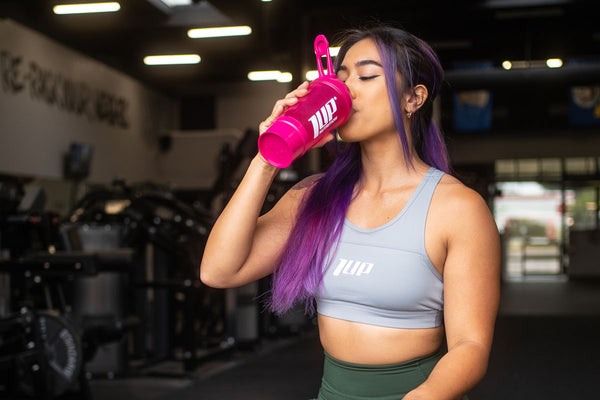When an individual shifts from being a recreational fitness enthusiast (e.g. he/she goes to the gym once in while) to a serious gym rat (i.e. following a structured program and training 3-5x per week), they typically consider purchasing supplements to improve their performance and boost their results. The two supplements most frequently purchased when an individual embarks on their fitness journey are creatine monohydrate and whey protein (with pre workout supplements being a close third).
Deciding which supplement is the right one to start with can be confusing, and frequently it leads into a discussion of “which one is better?” However, when you learn the role of creatine and protein powder, you’ll see it’s not really an either/or proposition. They can both be beneficial! And choosing with one (or both) to purchase depends on a few factors, including your goals, diet, and financial situation.
Today, we’ll briefly recap what does creatine do and how protein powder works as well as give you some things to consider when deciding which supplements to purchase for better results during your transformation challenge.
What is Creatine Monohydrate?
Creatine is a combination of three amino acids (glycine, arginine, and methionine) that is naturally produced by the body that aids cellular hydration, muscle fullness, and energy (ATP) production. In the body, creatine is stored as phosphocreatine (or creatine phosphate). When muscle cells need to rapidly produce ATP, a phosphate group from phosphocreatine is cleaved (“removed”) and can be donated to Adenosine Diphosphate (ADP) to form adenosine triphosphate (ATP).
As you may know (or may not), ATP serves as the “cellular currency” for energy production. The quicker your muscles cells can produce ATP, the longer and stronger they can do work, which burns more calories and lifts more weight for more reps -- all of which helps improve your results!
Additionally, since creatine also helps muscle cells absorb water, it aids cellular hydration. The better hydrated your cells are, the more resistant they are to thermal (heat) stress (e.g. training outdoors or in a poorly cooled gym).
What Are the Benefits of Creatine?
Creatine is referred to as the “king” of sports nutrition due to the fact it’s been studied extensively -- there are literally hundreds of creatine studies published in humans. It’s safe, effective, and beneficial to all manner of individuals (even those not specifically interested in building muscle and strength). Among the numerous research-backed benefits of creatine are[1,2,3]
- Increased lean muscle mass
- Greater max power & strength
- Increased performance during high intensity
- Improved work capacity
- Enhanced cognitive function
- Better recovery
How to Use Creatine Supplements
Creatine is typically consumed either pre-workout or post-workout; however, it can actually be taken any time of day, such as with breakfast or a pre-bed protein shake. The reason for this is that in order to get the benefits of creatine, it needs to be taken consistently. In this way, creatine is different from supplements that offer acute benefits (i.e. benefits within an hour or two of consumption), such as citrulline, caffeine, or Nitrosigine.
Research demonstrates that consuming 3-5 grams (3-5g) per day of creatine monohydrate is effective for increasing bodily creatine stores and improving numerous markers of athletic performance, body composition, and cognitive function.
The Best Creatine Monohydrate Supplement
1UP Pure Rebuild includes a full, research-supported 5,000mg (5g) creatine monohydrate per serving in addition to a full complement of BCAA and essential amino acids (EAAs), electrolytes, and betaine anhydrous (which works in tandem with creatine to support hydration, energy production, and body composition improvements).
What is Whey Protein?
Whey protein is one of two proteins found in milk (the other being casein protein). The two milk proteins occur in a 20% whey/80% casein ratio. Whey protein is a complete protein which means it contains all nine EAAs required for protein synthesis. It offers high bioavailability (efficiently used by the human body), digests quickly and easily, and is rich in BCAAs, especially leucine -- the “king” of amino acids.
What Are the Benefits of Whey Protein?
Similar to creatine monohydrate, whey protein has been rigorously investigated by researchers across a wide spectrum of applications. It is safe, well-tolerated, and beneficial for numerous circumstances. Specifically, research notes that whey protein may[4,5,6,7]:
- Enhance lean muscle mass (when used in conjunction with resistance training)
- Improve muscle recovery
- Aid fat loss and body recomposition
- Reduce feelings of hunger
- Support cardiovascular health
- Prevent muscle wasting
How to Use Whey Protein
Whey protein can be consumed anytime of the day, but it is most commonly used post-workout due to its high leucine/protein content as well as its rapid digestion. This makes it ideal for flooding muscles with key building blocks they need to repair themselves as well as stopping muscle breakdown.
Plus, intense exercise actually serves as an appetite suppressant (if you can believe that) for certain individuals, which means they may not be hungry immediately post workout, and therefore, missing out on a prime time to deliver essential nutrients to depleted muscles. Since whey protein is quickly digested and easy on the stomach, it offers an ideal option for individuals who suffer from poor/low appetite following hard workouts.
Whey protein is perfect post-workout (with a scoop of Pure Rebuild), mixed into water, milk, or your favorite alternative beverage, and it can also be incorporated into smoothies, cookies, pancakes, waffles, and other homemade protein bars and snacks.
The Best Whey Protein Powder
1UP Whey Protein supplies over 25 grams of delicious, high-quality whey protein per serving. Our whey protein is sourced from premier suppliers. It’s tested for purity, and it’s low in carbohydrates, fat, and lactose. Plus, 1UP Whey Protein also delivers exceptional flavors, backed by more than 14,000 independent reviews!
Creatine vs Whey Protein: Which is Better?
As mentioned at the outset, there really is no comparison between creatine and whey protein powder -- they offer unique and complementary benefits. Creatine improves ATP production and hydration while whey protein supports daily protein intake. So, if you’re already consuming enough protein from other foods in your diet -- beef, poultry, eggs, dairy, plant proteins, etc. -- then a protein powder may not be necessary. Yet, supplementing with creatine can still offer benefits.
Additionally, if you’re looking to increase your daily protein intake, then whey protein powder (or other protein powders or protein supplements) can help you meet your daily protein and macronutrient goals, which can be easily tracked in the 1UP Fitness App.
Can I Take Creatine and Whey Protein Together?
Absolutely!
Creatine supplements and whey protein work in a complementary fashion to support workouts, strength gains, and body recomposition. In fact, a favorite way to consume both supplements is in a post-workout shake, combining a scoop of Pure Rebuild with a scoop of 1UP Whey Protein. Two fantastic combinations are:
- Unflavored Pure Rebuild + 1UP Whey (Chocolate PB Blast is exceptional!)
- Pineapple Pure Rebuild + 1UP Coconut Ice Cream Whey -- to get those pina colada vibes
References
- Kreider, R.B., Kalman, D.S., Antonio, J. et al. International Society of Sports Nutrition position stand: safety and efficacy of creatine supplementation in exercise, sport, and medicine. J Int Soc Sports Nutr 14, 18 (2017). https://doi.org/10.1186/s12970-017-0173-z
- Roschel H, Gualano B, Ostojic SM, Rawson ES. Creatine Supplementation and Brain Health. Nutrients. 2021 Feb 10;13(2):586. doi: 10.3390/nu13020586. PMID: 33578876; PMCID: PMC7916590.
- Hall M, Manetta E, Tupper K. Creatine Supplementation: An Update. Curr Sports Med Rep. 2021 Jul 1;20(7):338-344. doi: 10.1249/JSR.0000000000000863. PMID: 34234088.
- Pal S, Ellis V. The chronic effects of whey proteins on blood pressure, vascular function, and inflammatory markers in overweight individuals. Obesity (Silver Spring). 2010 Jul;18(7):1354-9. doi: 10.1038/oby.2009.397. Epub 2009 Nov 5. PMID: 19893505.
- Paddon-Jones D, Westman E, Mattes RD, Wolfe RR, Astrup A, Westerterp-Plantenga M. Protein, weight management, and satiety. Am J Clin Nutr. 2008 May;87(5):1558S-1561S. doi: 10.1093/ajcn/87.5.1558S. PMID: 18469287.
- Frestedt JL, Zenk JL, Kuskowski MA, Ward LS, Bastian ED. A whey-protein supplement increases fat loss and spares lean muscle in obese subjects: a randomized human clinical study. Nutr Metab (Lond). 2008 Mar 27;5:8. doi: 10.1186/1743-7075-5-8. PMID: 18371214; PMCID: PMC2289832.
- Paddon-Jones D, Rasmussen BB. Dietary protein recommendations and the prevention of sarcopenia. Curr Opin Clin Nutr Metab Care. 2009 Jan;12(1):86-90. doi: 10.1097/MCO.0b013e32831cef8b. PMID: 19057193; PMCID: PMC2760315.






